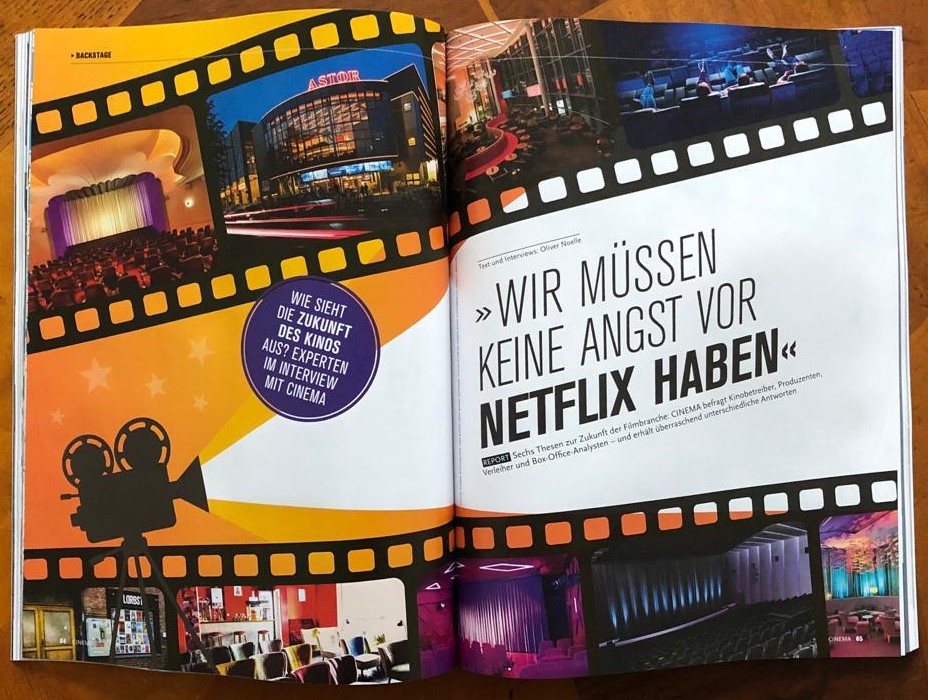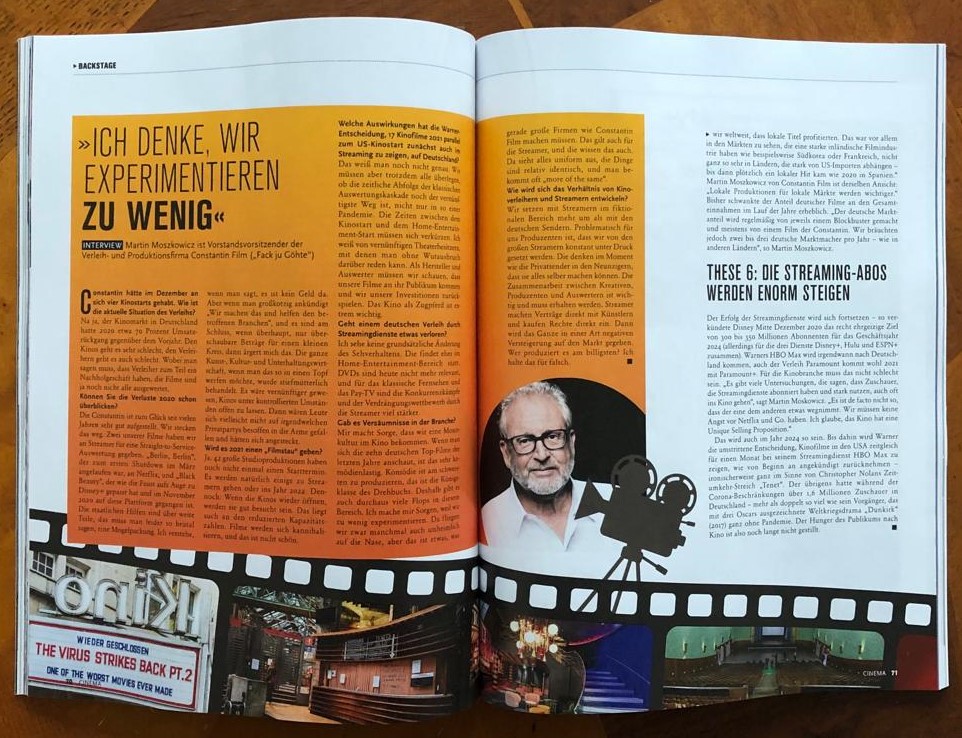Gower Street’s Director of Theatrical Insights, Rob Mitchell, was one of five industry experts interviewed in the latest issue of German Cinema magazine (2/21 February) by Oliver Noelle. The eight-page report asks how the future of cinema could look like after the end of the Corona-Pandemic. As theatrical film-going has survived multiple crises in its 125 year history (e.g. two World Wars, the Spanish Flu, TV etc.) the report discusses in its core text six hypotheses about the its future in Germany.
The first hypothesis is “There will be less cinemas”. Given the huge amount of loss since the beginning of the pandemic Martin Moszkowicz from Constantin Film estimates that unfortunately most likely 15% to 20% of German cinemas will need to close. It will most likely not just hit the small houses. Our Rob Mitchell adds that “for Cinemas with a few screens it’s a bit easier. Many independent cinemas were relatively successful in 2020. A single exhibitor can solve the Pandemic-Situation better than a chain.”
The second hypothesis is “There will be less movies made for cinemas”. Rob argues “The big US studios will either produce less movies overall or some directly for streamers – one of their own or an external streaming service. Most likely there will be less content from them for cinemas.” The text continues to discuss multiple ideas how, as a result of that, cinemas can get a brand themselves and optimize the event character of their offer.
The third hypothesis is “Theatrical movies are streamed earlier”. Different opinions are raised here. While some argue that any window – independently of its length – is good. Others state that especially many smaller titles are not being released at all theatrically due to overlong windows. Flexible windows are seen as a solution. Rob Mitchell adds: “The majority of studio films are doing 80% of their box office in the first two weeks. Most likely just a small number of movies will be in cinemas for longer than two or three weeks.”
The fourth hypothesis is “There will be more big-budget-movies made for cinema”. As a result of a shortened window, the content coming to cinemas could change. Rob argues “An all-in-one-marketing for a day-and-date theatrical and home entertainment opening could theoretically make sense, but especially in streaming it’s hard to get the majority of global markets aligned on one day. Consequently, I think that for the studios the big-budget-movies are most attractive, which concentrate on the first two weeks in cinemas. On top of that movies which promise a high margin, like low-budget horror.” Mid-Budget movies like late sequels and comedies are less likely to get a theatrical release. They are already in the hands of Netflix. This could be different for studios that own a streaming service. Mitchell adds “A theatrical release for those kind of movies could be a good option for Disney; work as an advertising window for the opening on Disney+.”
The fifth hypothesis is “There will be more German movies made for cinema”. Rob opens on that by stating: “The chances of a theatrical release will be better in the future for non-Hollywood movies. During the first re-opening period we saw globally that local titles benefited. That was particularly clear in markets that have a strong local movie industry like South Korea and France; less in countries that were more reliant on US imports.” The text continues with a call for more relevant German local productions.
The report’s final sixth hypothesis is “Streaming Subscriptions will increase significantly”. The growing number of streaming subscriptions and services are a fact. However, this does not need to be a threat to the cinema industry, as it has a USP.
The text closes with highlighting that TENET doubled the admission of Christopher Nolan’s prior movie DUNKIRK in Germany, despite being released in a time with COVID-19 restrictions in place. The author sees this as proof that the audience hunger for cinema isn’t satisfied yet.
The report also features three break out interviews with Martin Moszkowicz, chairman of Constantin Film; Christian Becker, Managing Director / Producer of Rat Pack Filmproduktion; and Hans-Joachim Flebbe, Managing Director of Premium Entertainment and founder of CinemaxX.
The feature is exclusively available in the print issue of the Cinema magazine, on sale now in all good (German) stores or to order here.





